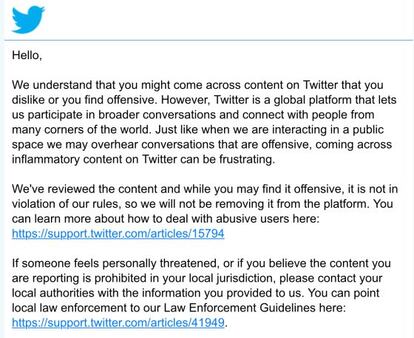Two men arrested for harassing TV news anchor on social networks
Lara Siscar, who put up with years of abuse, complains of a lack of assistance from Twitter

Spain’s National Police force has arrested two men who spent years harassing a well-known television news anchor through social networking sites.
“I had the feeling that if this individual was standing in front of me, he would eliminate me,” said Lara Siscar – who presents the weekend news for the state broadcaster RTVE – about one of the detainees.
The suspects, who acted independently from one another, created up to 30 phony profiles on social networking sites in order to send Siscar threatening and denigrating messages, according to a police statement.
At first you try to ignore it, later you realize that you can’t and that it’s part of your daily life”
One of them even approached her on the street on two occasions after she repeatedly turned down his online requests for a private meeting.
This individual was arrested in Madrid in February after harassing Siscar for several months on a daily basis. A second man was detained in Palencia this week for similar reasons. But the online intimidation began a long time ago.
“I was forced to close my Facebook account in 2009. But this last particularly bad period has come mostly through Twitter, which provides more direct access to people,” she told EL PAÍS.
Around two years ago, Siscar saw how one user’s routinely flattering messages gradually became more negative. “He started getting angry, asking why I wasn’t answering his messages, why I was replying to others but not to him. It ended up as a completely irrational and brutal hatred of me,” Siscar explained.
“I began saving screenshots in July 2014, and in October, when it had become such tremendously violent abuse that I was suffering from anxiety, I decided to go to the police,” she said. “They told me that this was savagery, that it was not normal, that it was harassment and that harassment is a crime, whether it be physical or through the social networks.”
Siscar filed a complaint, and after an eight-month investigation, the police arrested the two men.

The news anchor was particularly disappointed with the lack of cooperation from the companies that run these social networks, particularly Twitter.
“The police had trouble finding him because Twitter would not give them his computer’s IP address. I received a message from Twitter saying that they did not consider that the most aggressive user was breaking their rules, and so they would not shut down his profile,” she explained.
Siscar insisted that this attitude makes victims of online abuse feel very helpless.
“This really affected my personal life,” she said. “I stopped checking Twitter after 6pm because I knew I could not sleep if I did. When bullfighting came up in the news I knew he would use that to attack me because he says he is against it and uses it as an excuse to insult me. And this, every day, several times a day, for years.”
He started getting angry, asking why I wasn’t answering his messages, why I was replying to others but not to him”
The stalker even started sending intimidatory messages to other members of her family, including her mother and her partner.
Siscar did not go to the police earlier because she was hoping the problem would go away on its own.
“At first you try to ignore it, but later you realize that you can’t and that it’s part of your daily life,” she said. “One day I caught myself thinking that I didn’t want to work in front of a camera anymore. I had never had a problem with that before, so it was a sign of how much I was affected. You suddenly feel yourself getting small.”
Tu suscripción se está usando en otro dispositivo
¿Quieres añadir otro usuario a tu suscripción?
Si continúas leyendo en este dispositivo, no se podrá leer en el otro.
FlechaTu suscripción se está usando en otro dispositivo y solo puedes acceder a EL PAÍS desde un dispositivo a la vez.
Si quieres compartir tu cuenta, cambia tu suscripción a la modalidad Premium, así podrás añadir otro usuario. Cada uno accederá con su propia cuenta de email, lo que os permitirá personalizar vuestra experiencia en EL PAÍS.
¿Tienes una suscripción de empresa? Accede aquí para contratar más cuentas.
En el caso de no saber quién está usando tu cuenta, te recomendamos cambiar tu contraseña aquí.
Si decides continuar compartiendo tu cuenta, este mensaje se mostrará en tu dispositivo y en el de la otra persona que está usando tu cuenta de forma indefinida, afectando a tu experiencia de lectura. Puedes consultar aquí los términos y condiciones de la suscripción digital.









































